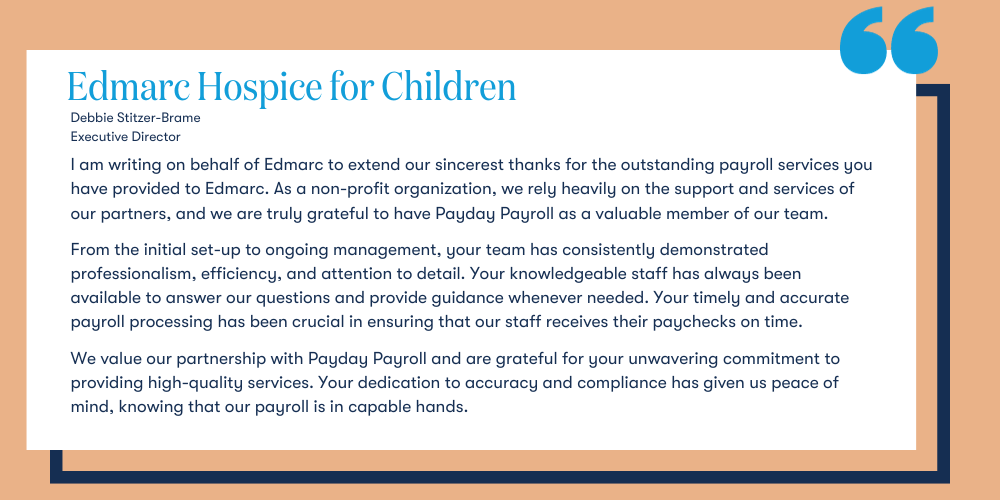Volunteers are the backbone of non-profit organizations, but as the organization grows, it eventually needs to hire paid staff for specialized and ongoing efforts. However, setting up payroll for non-profits can be a tricky process, especially for the first time.
It is essential to observe non-profit payroll guidelines to stay compliant with state and local laws. To ensure compliance and protect your non-profit status, it is crucial to use a reliable system when setting up payroll for your non-profit.
How to Set Up Payroll as a Non-Profit
In most ways, setting up payroll as a non-profit is no different from setting up payroll at a for-profit venture.
You'll need a federal employer identification number (EIN) and a state payroll tax identification number (TIN) if your state has an income tax. You may also need a local tax identification number if your area has a local income tax. These are all needed for filing payroll taxes.
Next, you will need to collect information on the following forms from all employees:
- Form I-9 is used to verify that someone is eligible for employment.
- Form W-4 is used to determine how much federal tax is withheld.
- Any applicable state and local tax withholding forms.
Using Grants to Pay Employees at a Non-profit
Grants play a crucial role in the funding of most non-profit organizations. These funds can be utilized to cover various expenses throughout the year, including paying employees. However, non-profit organizations must comply with payroll regulations, which require accurate tracking of the usage of grant funds.
Employees whose wages are paid through grants must keep a record of their work hours and activities to ensure they are eligible for payment through grant funds. With the right HR tools for non-profit organizations, payroll processing can be simple, automated, and compliant.
Executive and Board Member Pay at Non-profits
Executive pay at a non-profit must be handled in ways that comply with IRS regulations. The IRS requires that executives and board members receive pay that is considered "reasonable compensation" for their work. This means that pay is similar to what they would receive at a for-profit enterprise.
This includes wages, bonuses, benefits, and anything else that could be considered compensation. While there are no hard and fast rules, research can show what executives are being paid at similar organizations.

Other Obligations You Face as a Non-profit
To remain compliant with payroll tax and employee compensation regulations, it is necessary to fulfill some additional requirements. It is important to note that non-profit organizations are not exempt from payroll taxes. The tax exemptions only apply to the federal income tax and federal unemployment taxes (FUTA).
Non-profits are still expected to withhold and deposit funds for Federal Insurance Contributions Act (FICA) taxes. These include Medicare and Social Security taxes.
Non-profit organizations are obligated to comply with the minimum wage and overtime regulations. The wages paid to employees must meet or exceed the federal or state minimum wage, depending on which is higher. This rule applies to all employees who are on the payroll.
If an employee works more than 40 hours per week, they are entitled to overtime pay, calculated at 1.5 times their regular hourly wage. This overtime pay is applicable to all non-exempt employees.
Protecting Your Tax-Exempt Status
Nonprofits with 501(c)(3) designation are exempt from federal income taxes, but compliance is required to maintain their status. Some things that could endanger that status include:
- Unrelated business income. This can happen when a non-profit brings in too much income from activities outside the organization's purview.
- Private benefit. This happens when an organization's activities benefit a private interest or an insider at the organization.
- Failure to report. Form 990 must be filed each year.
- Lobbying and political activity.
Payday Payroll's Give Back Program
At Payday Payroll, our dedication to community support goes beyond providing exceptional payroll services. Central to this commitment is the Payday's Give Back Program, where we donate 10% of the annual payroll invoice amount back to our non-profit partners.
For non-profits partnering with Payday Payroll, this program offers more than just payroll solutions; it represents our promise to invest in their success and growth. Our belief is that real success is achieved when we support and uplift each other, creating a more vibrant and resilient community for everyone.
We Can Help
Setting up payroll for a non-profit can be challenging due to complex regulatory requirements. However, achieving and maintaining compliance is simple with the right guidance and tools, such as those offered by Payday Payroll.
Payday offers a comprehensive suite of tools and services designed specifically for non-profits. Our team of experts has a deep understanding of the regulatory landscape and can help your organization navigate the complexities of payroll processing.
Looking to set up an efficient and compliant payroll system for your non-profit? Get expert help and tailored solutions from Payday Payroll. Contact us today.


